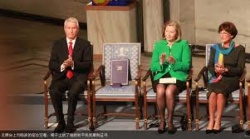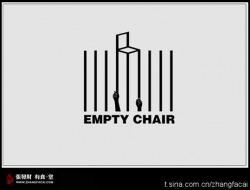“Empty chair”的版本间的差异
来自China Digital Space
| 第7行: | 第7行: | ||
For more on China’s attempt to censor images empty chairs, see [http://www.news.com.au/technology/china-erases-picture-of-nobel-winners-empty-chair/story-e6frfro0-1225970053429 here] (English) and [http://chinadigitaltimes.net/chinese/tag/%E7%A9%BA%E6%A4%85%E5%AD%90/ here] (Chinese). | For more on China’s attempt to censor images empty chairs, see [http://www.news.com.au/technology/china-erases-picture-of-nobel-winners-empty-chair/story-e6frfro0-1225970053429 here] (English) and [http://chinadigitaltimes.net/chinese/tag/%E7%A9%BA%E6%A4%85%E5%AD%90/ here] (Chinese). | ||
| − | [[File:emptychair3.jpg|250px|thumb| | + | [[File:emptychair3.jpg|250px|thumb|left]] |
[[Category: Grass-Mud Horse Lexicon]] | [[Category: Grass-Mud Horse Lexicon]] | ||
2013年9月23日 (一) 23:57的版本
空椅子 (kōng yǐzi): empty chair
Writer and dissident Liu Xiaobo, who was sentenced to an 11-year prison sentence for “inciting subversion of state power” in 2009, was awarded the 2010 Nobel Peace Prize. Unable to attend the award ceremony in Oslo due to his incarceration, the laureate was represented by his empty seat. Shortly thereafter, the term “empty chair” became a sensitive word in Chinese cyberspace.

Some bloggers who used the term online following the 2010 Nobel ceremony had their accounts blocked, and some who participated in a campaign to post images of empty chairs saw their posts censored—some accounts were even deleted for posting the image.
For more on China’s attempt to censor images empty chairs, see here (English) and here (Chinese).







